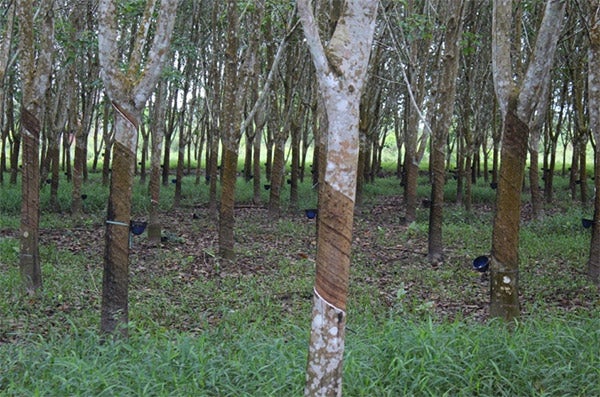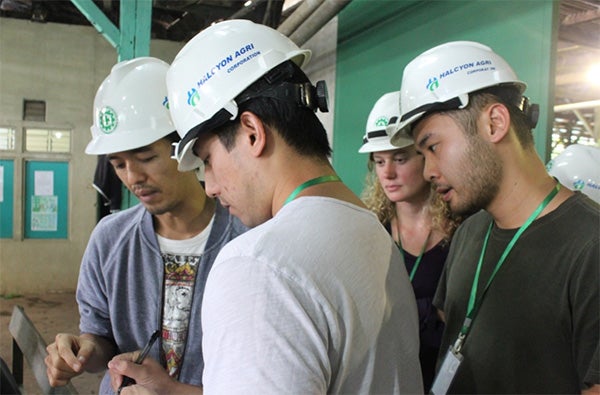A Strategy to Encourage Sustainable Production of Rubber in Indonesia
A Strategy to Encourage Sustainable Production of Rubber in Indonesia

Pak Hendry, quality assurance manager at Halcyon Agri, demonstrates the rubber tapping process in West Kalimantan, Indonesia | The team visited with Mr. Suchon, a rubber plantation owner, in West Kalimantan, Indonesia
Conservation International (CI), our client for our Applied Management Research field study project, is a global nonprofit organization that seeks to advocate for, improve and protect nature for the betterment of society. CI operates in more than 30 countries worldwide across the Americas, Africa, Asia and the Pacific.
Although CI has deep experience working with commodities such as palm oil, the organization is a relative newcomer to natural rubber, an industry that is valued at approximately $20 billion. Given its climate and soil, Southeast Asia has become the primary target to grow and produce rubber, accounting for 90 percent of total natural rubber production. Tire production represents approximately 70 percent of total natural rubber consumption today, and demand for the commodity has increased by 22 percent since 2010.
CI identified for our team how the organization could help reduce the effects of deforestation caused by the natural rubber production process in Indonesia. However, while conducting our field research, we discovered that deforestation in Indonesia is actually a symptom of a much more urgent humanitarian issue concerning the unsustainable livelihoods of natural rubber farmers.
Our team traveled to Singapore and Indonesia in early December 2018 to conduct our field research. We kicked off the research with a visit to CI’s Singapore office. During our five days there, we conducted six interviews with global tire manufacturers Goodyear, Pirelli and Michelin; three interviews with global rubber processor Halcyon Agri; two interviews with Procter & Gamble; and one interview with the International Rubber Study Group. These meetings began to crystallize the major issues facing the natural rubber industry, which include supply shortages, price volatility and quality issues.

Natural Rubber Extraction
The Indonesian leg of our trip kicked off in Jakarta. During our three days in the city, we met with CI’s Indonesian team, conducted one interview with global rubber processor Kirana Megatara, two interviews with the Roundtable on Sustainable Palm Oil, one interview with GAPKINDO (Rubber Association of Indonesia) and three interviews with other NGOs that are engaged in natural rubber initiatives in the region. This time in Jakarta was instrumental in our getting a more complete picture of the socioeconomic issues rubber smallholders are facing, as well as the ongoing humanitarian efforts by various stakeholders to supply educational, communication and bargaining tools to farmers in the region.

The team met with Pak Hendry, quality assurance manager at Halcyon Agri, in a factory outside Pontianak, Indonesia
We traveled to West Kalimantan, Indonesia, for the last leg of our trip. We spent two days in a region about three hours outside of the city of Pontianak conducting interviews with five different natural rubber smallholders, middlemen and plantation owners. We were able to visit a few different rubber forests and witness the rubber-tapping process firsthand. We also visited one of Halcyon Agri’s rubber factories, where we observed the natural rubber cleaning, drying and production process. Interacting directly with rubber farmers and spending time in a rubber factory were incredibly educational, especially in terms of the challenges the industry faces in making the natural rubber production process more sustainable and the need for immediate action to assist Indonesian rubber farmers.
Our field research was immensely successful because it highlighted the immediate issues plaguing the natural rubber industry, including the following, which are specific to Indonesia:
- Natural rubber prices: The price of natural rubber is dictated by the Singapore, Tokyo and Shanghai exchanges, and it often doesn’t reflect the true market for rubber. The current, incredibly low price of rubber makes it extremely difficult for farmers earn a living and for the global processors to turn a profit. In addition, it is common for rubber middlemen and traders to hoard their rubber and sell only when prices increase, effectively creating a supply shortage.
- Livelihood of smallholders: The low price of natural rubber makes it nearly impossible for Indonesian smallholders to earn a sustainable living. The lack of rubber-tapping expertise and access to educational and technological resources reinforce farming practices that are both detrimental to the environment and lead to low rubber yields.
As CI enters the natural rubber industry, we hope to provide the organization with a strategy to encourage sustainable production practices and to improve price stability.
UCLA Anderson MBA students conduct Applied Management Research (AMR) projects in lieu of a thesis. The nation’s first business school field study program, AMR partners students with top organizations to solve a key strategic problem. The Center for Global Management supported UCLA Anderson Class of 2019 teams to conduct critical primary research and collaborate with established NGOs seeking sustainable strategies to improve local economies, health and education outcomes, empowering local communities and developing more sustainable supply chains in environmentally sensitive parts of the world.